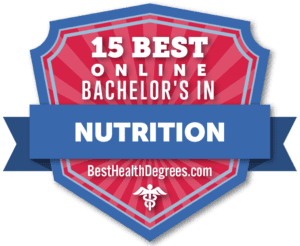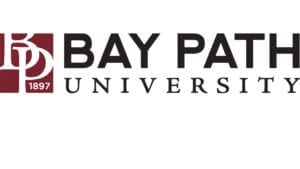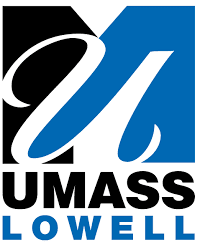
Key Takeaways:
- Purdue University Global and Arizona State University have two of the top online bachelor’s in nutrition degrees.
- Graduates can become nutritionists or dietitians, working in diverse settings like hospitals, wellness centers, or private practice.
- Courses typically include nutritional counseling, food safety, and a capstone project.
- Many online programs are accredited and prepare students for certifications such as Board Certified in Holistic Nutrition.
How do you define nutrition? Most people consider it just the food we eat when we’re hungry, but it’s far more than that.
The science of nutrition uses research and methods to look at a wide variety of concerns such as diet, health, or medicine. Nutritionists cover a broad spectrum of interests from community nutrition services, general nutrition education, health and wellness, or sports nutrition. Although nutritionists aren’t regulated or required to be licensed, baccalaureate degrees are the best way to learn about the field.
Also involved in Nutrition Science are dietitians. Simply put, dietitians are specialists in assessing and diagnosing nutritional issues in both healthy and not-so-healthy patients. Registered Dietitians are typically licensed following an undergraduate education, 1,200 hours of supervised practice, and passing the Commission on Dietetic Registration exam. Some Registered Dietitians may receive additional clinical credentials to work in hospitals, clinics, or long term care facilities.
Best Health Degrees has researched and reviewed online nutrition and dietetic programs that will give you a good place to start your school search for the program which best fits your career goals.
Our Method: 15 Online Nutrition Bachelor’s Degrees
For our ranking of the best online nutrition bachelor’s programs, Best Health Degrees editors researched accredited, respected institutions focused on quality and opportunity. Programs are ranked according to their reputation, salary potential, and tuition cost, using data from U.S. News, Niche, IPEDS, and College Scorecard.
1. Purdue University Global
The completely online Bachelor of Science in Nutrition degree requires 180 quarter credit hours for completion and is offered in 10-week terms. This program is approved by the National Association of Nutrition Professionals (NANP) and prepares students to sit for certification exams. Specifically, the B.S. in Nutrition provides the academic foundation to achieve credentials in: Board Certified in Holistic Nutrition, Certified Clinical Nutritionist (CCN), and Certified Dietary Manager (CDM).
Subject studied include Nutritional Counseling, Food Safety and Microbiology, Nutrition Planning and Management, Nutritional Analysis and Assessment, and a capstone project in nutrition. The program will prepare students to become Dietetic Technicians.
Purdue Global is a division of the esteemed Purdue University and is accredited by the Higher Learning Commission. Since online learning isn’t for everyone, Purdue Global offers a risk-free, three week trial period. You’ll enroll in real classes that will apply toward the degree without paying any tuition until finishing the introductory period.
Degree Offered: B.S. in Nutrition
Want to know more? Click here!
2. Arizona State University
The online Bachelor of Science in Nutrition degree at ASU can be completed in 40 total classes and requires 120 credit hours. ASU ranks #6 in U.S. News and World Report’s “Best Online Bachelor’s Programs” as well as #1 in “Most Innovative Schools.”
You’ll take general education courses along with classes in Applied Food Principles, Development of Healthy Cuisines, Nutrition in the Life Cycle, and more. The program offers a special track in Food Entrepreneurship for those wishing to go into business. This B.S. will prepare you to work in a variety of nutrition jobs in the areas of food service management, food production, as well as journalism or marketing in health topics. Admission requires ACT/SAT scores, high school diploma and transcripts, an application fee, and file the Free Application for Federal Student Aid (FAFSA®).
Degree Offered: B.S. in Nutrition
Want to know more? Click here!
3. Texas Woman’s University
Don’t let the name fool you, Texas Woman’s University has been admitting men for over 50 years. This completion degree in Nutrition Science is for students who transfer from a community college with an Associate’s degree or a minimum of 12 semester hours and 15 hours WECM (workforce education). Students transferring from a Texas community college are assured admission.
Subjects in the curriculum covers a range of nutrition topics from community management of services, sports, as well as the general life cycle. Nutritional trends, how cultures define food, and the ecology of food and nutrition are also examined in the curriculum. General education coursework is part of this degree.
Niche considers Texas Woman’s University a “Best Value Colleges in America” as well as one of the top 25 “Best Colleges in Texas.” Forbes also names the university one of “America’s Best Value Colleges 2019.”
Degree Offered: BAAS in Nutrition
Want to know more? Click here!
4. Eastern Michigan University
The College of Health Sciences of Eastern Michigan University provides an online B.S. in Dietetics degree which is a Coordinated Program in Dietetics (CP). You’ll complete general education courses in topics such as English, history, social and natural sciences, etc. along with your major classes (a minor is not required). The degree requires 124-credit hours for completion and is fully ACEND accredited.
Online courses include studies in Nutrition Therapy, Food and Culture, Community Nutrition, Integrative Medicine, and others. You’ll also complete a practicum experience. Working with the Dietetics Clinical Coordinator, you’ll be responsible for identifying qualified preceptors for experience courses. You can learn more about the preceptor process here. On graduation, you’ll be eligible to sit for the Registration Examination for Dietitians through the Commission on Dietetics Registration of the Academy of Nutrition and Dietetics.
You’ll need to be admitted to EMU and may need prerequisite courses prior to being admitted to the College of Health and Sciences. The college will screen references, GPA, personal statement, and overall application. You’ll also need to complete an online assessment via the Kira Talent Platform.
Degree Offered: B.S. in Dietetics
Want to know more? Click here!
5. University of Alabama
Through the University of Alabama’s “Bama by Distance,” this is an online B.S. in Food and Nutrition for aspiring registered dietitians. Niche names the university one of the 50 “Top Public Schools in America” and U.S. News and World Report rates UA a “Best Value School” and “Best Colleges for Veterans.” The 120-credit hour, online baccalaureate is only one of three ACEND accredited online programs in the U.S.
Along with general education coursework, you’ll take Food and Nutrition classes in Medical Nutrition Therapy, Food Science, Nutritional Biochemistry, Quantity Food Production & Service, etc. Additionally, you’ll take 5 science courses in areas such as anatomy and physiology, chemistry (also organic chemistry), and microbiology. In addition to the online coursework, you’ll be expected to complete field experiences, which can be conducted in your home area under the supervision of a Registered Dietitian. While administered online, exams and tests may require a proctor, whom you’ll need to identify and have approved by the program.
Degree Offered: B.S. in Food and Nutrition
Want to know more? Click here!
6. Georgia State University
The Lewis College of Nursing and Health Professions at Georgia State University offers a partially online B.S. in Nutrition degree with two concentrations in nutrition science or nutrition and wellness. The nutrition science concentration is perfect if you’re looking for a pre-professional degree for admission to medical, pharmacy, dietetic studies. This track includes general education courses, physiology, nutrition, biology, physics, etc. You’ll want to choose this concentration if you want to enter the Coordinated Program to become a registered dietitian.
The nutrition and wellness speciality will prepare you for entry-level positions in wellness, nutrition, and health careers. With this concentration, you’ll study gerontology and nutrition (required) and choose from electives in such fields as psychology or sociology. General education courses are also required.
GSU has a 98% pass average for the registered dietitian exam over a three year period.You should be aware that not all courses are offered online.
Degree Offered: B.S. in Nutrition
Want to know more? Click here!
7. Bay Path University
The American’s Women’s College at Bay Path University has an online Bachelor of Arts in Leadership and Organizational Studies degree with a food science and safety concentration. Bay Path University is a private, all-woman’s school and this program may completed by women only.
Coursework includes topics in foodborne microorganisms and diseases, food processing, healthy living, etc., along with general education classes. Lab work is required for some courses and Bay Path has a special virtual labs component for online students. You’ll conduct experiments through a simulated laboratory via your computer. This 120-credit hours degree can lead to positions in food science, research and development technology, food safety, food production management, or flavor technologist and more.
Founded in 1897, Bay Path is included in U.S. News and World Report’s “Best Online Bachelor’s Programs” and “Most Innovative Schools” categories.
Degree Offered: B.A. in Leadership and Organizational Studies
Want to know more? Click here!
8. University of Northern Colorado
Here’s an ACEND accredited B.S. in Dietetics distance program. This program is for students seeking their first baccalaureate degree in a Didactic Program in Dietetics (DPD) and wish to pursue licensure or registered dietitian credential. Courses will prepare you for dietetic internships or for entry-level dietetics career positions.
In addition to general education classes, you’ll study behavioral sciences, biochemical, physiological, and influences on food accessibility and dietary intake. Additionally, studies will develop skills to assess the effect of nutrition through the life cycle. Nutritional subjects you’ll study include nutrition assessment, medical nutrition intervention, community nutrition, and more. On completing this bachelor’s degree, you’ll be eligible for the Verification Statement which enables you to participate in an accredited internship, an important step toward becoming a registered dietician.
Degree Offered: B.S. in Dietetics
Want to know more? Click here!
9. Kansas State University
The Global Campus of KSU offers a B.S. in Dietetics you can complete online. This is a Didactic Program in Dietetics that will culminate with the degree as well as a Verification Statement for dietetic internships. The 120-credit hours curriculum covers general education studies and includes 41-credits in core courses. Clinical nutrition, nutrition through the life cycle, nutrition and public health, food science, basic nutrition, and others.
You’ll need to be admitted to Kansas State University Global Campus and be a pre-dietetics major. Midway through your degree plan, you’ll apply for admission to the DPD program. The DPD is highly competitive (only 115 students enrolled at any one time) and you’ll need a minimum of a 3.0 GPA to be considered. Prerequisite studies are required for DPD admission in areas such as biology, anatomy and physiology, chemistry, biochemistry, etc.
Niche names KSU as a “Best Colleges in America” and “Best Value Colleges in America.” U.S. News and World Report names KSU as offering a “Best Online Bachelor’s Programs” as well.
Degree Offered: B.S. in Dietetics
Want to know more? Click here!
10. Rutgers University
Rutgers University’s online B.S. in Nutrition and Dietetics degree is designed for the dietetic technician registered (DTR) and graduates can sit for the CDR Credentialing Examination for Dietitian Nutritionists. There are three options for this program: Second Bachelor’s Degree, Second Bachelor’s Degree Program for NDTR (includes Verification Statement) or Bachelor of Nutrition and Dietetics (BSND) Joint Degree Option (offered with Thomas Edison State University). The three options share core courses in Nutritional Microbiology, Nutritional Biochemistry, Nutritional Assessment, Principles of Diversity & Ethics in Healthcare, etc., followed by professional specific studies.
This program includes 1200 hours of supervised practice in the student’s home community, online didactic coursework, and flexible full-time or part-time options.
Note: As of February 2020, Rutgers is not currently accepting applications for this program.
Degree Offered: B.S. in Nutrition and Dietetics
Want to know more? Click here!
11. University of Arizona
The online B.S. in Nutritional Science at the University of Arizona is one a very few ACEND accredited dietetics programs. You can follow either the dietetics or nutrition tracks, depending on your overall career goals. If you’re wanting to become a registered dietician, the dietetics track is your first step. Should you want to pursue an advanced degree in sciences such as medicine, pharmacy, nutrition, food science, and others, the nutrition track is for you.
Both tracks require general education courses in English, humanities, social science, etc., and share core classes as well. Some of the core courses are anatomy, physiology, general chemistry, metabolism, nutrition, biology, and others.
There is no out-of-state tuition and offers discounts to active military. The University of Arizona online degrees have been ranked #11 in “Best Online Bachelor’s Programs” by U.S. News and World Report.
Degree Offered: B.S. in Nutritional Science
Want to know more? Click here!
12. Huntington University of Health Sciences
Considered as one of U.S. News and World Report’s “Best Value Schools,” Huntington University has an online B.S. in Nutrition through its Health Sciences division. This program requires 129-credit hours for completion and accepts up to 95 transfer credit hours. Unique in its curriculum, the program includes the study of contemporary topics in nutrition and prepares students with an integrative, clinical nutritional approach.
Required coursework includes studies in natural sciences and core nutrition classes. Among core courses are Pathophysiology, Medical Terminology, and Health & Wellness. Classes in the major offer a broad foundation in several nutrition issues such as vegetarianism, eating disorders, geriatric concerns, counseling skills, and more. Students will end their studies with a capstone project.
In addition to an admission application, academic transcripts, a copy of a government-issued photo ID, and an interview.
Degree Offered: B.S. in Nutrition
Want to know more? Click here!
13. UMass Lowell
If you’re interested in nutrition and would be interested in studies as a minor, you may want to explore the nutrition minor through the Department of Biomedical & Nutritional Sciences. You’ll need departmental authorization and show a minimum of 23 semesters hours with 9 hours of upper division courses. It’s presumed you need to be a UMass student to minor in this field.
Although the baccalaureate degree in nutrition isn’t offered online, courses for the minor are available. Studies include topics in anatomy and physiology, nutrition through the life cycle, community and human nutrition, vitamins, medical nutrition therapy, as well as obesity and weight control. Once the minor is declared, you must maintain at least a B- or better.
UMass Lowell was established in 1894 and is part of the University of Massachusetts System. The school offers 120 bachelor’s, 43 master’s and 25 doctoral degree programs. UMass has a current enrollment of over 18,000 students and has a 63% graduation rate.
Degree Offered: Minor only
Want to know more? Click here!
14. Texas Tech University
Texas Tech University also offers an online minor in Nutritional Sciences which can be completed in 18-credit hours. You’ll be required to complete the Science of Nutrition course and five additional classes. Coursework would include studies in Nutrition for Health, Fitness, and Sport, Nutrition in the Life Cycle, Medical Terminology, Nutrition and Chronic Disease, etc. The required course and six of the eleven elective courses are offered online.
To minor in Nutritional Sciences, you’ll need a minimum of 18 hours of specific coursework, and receive approval from an advisor. If you’re enrolled in an interdisciplinary studies degree, this minor can be used as a concentration.
Texas Tech University’s Department of Nutritional Sciences participates in the The Nutrition & Metabolic Health Initiative offering nutritional services to the Lubbock community. This initiative also conducts research, counseling and education, and student training. Texas Tech consistently receives high marks for its online bachelor’s programs from U.S. News and World Report. Niche ranks it #72 “Top Public Universities in America” as well as #201 “Best Colleges in America.”
Degree Offered: Minor only
Want to know more? Click here!
15. Weber State University
The undergraduate B.S. in Nutrition Education can lead to a variety of careers or graduate work. This program offers two areas of emphasis in Integrative Nutrition or Sport Nutrition.
Integrative Nutrition combines nutritional curricula with other health-supportive fields of study. Child and Family Studies, Exercise Science, Recreation, and Botany are some of the incorporated areas of study. This program will prepare students for advanced, graduate study in nutrition.
The Sport Nutrition concentration includes studies in sports and fitness nutrition, diet design and analysis, lifespan nutrition, and diet therapy, along with others. The curriculum offered meets prerequisites for many Registered Dietitian Nutritionist graduate programs.
Weber State University is one of U.S. News and World Report’s “Best Online Bachelor’s Programs.”
Degree Offered: B.S. in Nutrition Education
Want to know more? Click here!
15 Best Online Exercise Science Degree Programs
Is Nutrition and Dietetics a Good Career?
Pro: Careers in nutrition and dietetics are expected to grow at a much faster rate than other jobs, with an 11% increase between 2018-2028. These professionals are self-employed, and work in government agencies, healthcare systems, outpatient and wellness centers, as well as long-term care and assisted living facilities.
Con: Sometimes working with people with an illness or disease can be depressing. You may work with people with heart disease, cancer, obesity, or diabetes. Dietitians and nutritionists always work with people who need help in maintaining a healthy lifestyle.
Pro: U.S. News and World Report conducted a job satisfaction survey among nutrition professionals and ranked the career #24 in “Best Healthcare Jobs” and #88 in “Best Jobs.” If you enjoy helping people and have an interest in food, food safety, nutritional needs of adults and children, this may be the career for you.
Cons: Salaries aren’t terrific, but they’re not horrible, either. PayScale sets the average national average for nutritionists between $31,000-$72,000. The Bureau of Labor Statistics suggests between $38,000-$66,000, with a median salary of $60,370 per year. The Bureau’s numbers combine nutritionists’ and dietitians’ salary estimates together.
Registered Dietitians, according to PayScale, receive $41,000-$68,000 annually, with a median, national salary of $52,000 a year. You should also factor in how your earnings are influenced by other compensation such as retirement and healthcare plans, paid time off, bonuses, and tuition reimbursement.
What is the Difference Between a Didactic Program and a Coordinated Program?
Registered Dietitians are required to be licensed and credentialed. Nutrition Science and dietitian programs follow the criteria required for the Accreditation Council for Education in Nutrition and Dietetics (ACEND). There are usually two programs:
The didactic Program in Dietetics (DPD) provides students with the academic coursework necessary to practice dietetics; however, that is only step one. Step two requires students to participate in a 1,200-hour, supervised internship, where they gain practical experience. Students in a DPD program will receive a Verification Statement which you need to find an independent internship. Step three involves taking the Commission on Dietetic Registration (CDR) exam.
The Coordinated Program (CP) offers all three steps in one program. You’ll cover the same ACEND-accredited coursework as a DPD and complete the supervised practical experience in the same degree program.
Beginning January 2024, ACEND will require registered dietitians to have graduate degrees in the field. To meet that deadline, many schools have developed accelerated BS/MS dietician programs that can be completed in five years, rather than six.
Can I Become a Nutrition with an Online Degree?
Yes. Online B.S. and B.A. degrees in nutrition are available. In addition to a bachelor’s degree in nutrition, students can also earn a master’s degree in the field. These distance education, ACEND accredited, degrees offer the same curriculum that on-campus students follow. Nutritionists aren’t required to be licensed or certified. Some nutritionists, however, do seek certification as Board Certified in Holistic Nutrition, Certified Clinical Nutritionist (CCN), and Certified Dietary Manager (CDM).
Accredited Didactic Programs Dietetics (DPD) are also available online. Students who attend online DPD programs will also receive a Verification Statement which will allow them to make an application to an independent practicum.
Related:
- 25 Best Nutrition Bachelor’s Degrees
- 10 Most Affordable Online Nutrition Bachelor’s Degrees
- Best Online Nutrition Certificates
- What Jobs Can You Get With a Health Science Degree?
- What Can I Do with a Bachelor’s in Nutrition?
- Best Types of Counseling Degrees
- Kinesiology and Exercise Science Salary
- What Can You Do with a Human Service Degree?
- CNA Degree and Educational Guide
- What Can You Do With a Master’s in Psychology Degree Program?
- 10 Cheap MSN Online Programs
- Kinesiology and Exercise Science Salary with an Associate Degree
- What Can You Do with a Degree in Nutrition?













